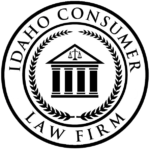Idaho Debt Collectors have certain limitations in the types of debts they can collect or attempt to collect. Idaho Code 26-2229A states:
No collection agency licensee, or collection agency required to be licensed under this act, or agent of such collection agency shall collect or attempt to collect any interest or other charges, fees, or expenses incidental to the principal obligation unless such interest or incidental fees, charges, or expenses:
(a) Are expressly authorized by statute;
Idaho Code 26-2229A
(b) Are allowed by court ruling against the debtor;
(c) Have been judicially determined;
(d) Are provided for in a written form agreement, signed by both the debtor and the licensee, and which has the prior approval of the director with respect to the terms of the agreement and amounts of the fees, interest, charges and expenses; or
(e) Reasonably relate to the actual cost associated with processing a demand draft or other form of electronic payment on behalf of a debtor for a debt payment, provided that the debtor has preauthorized the method of payment and has been notified in advance that such payment may be made by reasonable alternative means that will not result in additional charges, fees or expenses to the debtor.
Court and Idaho Department of Finance Interpretation
In 2014, a debt collector tested the limits and meaning of this statute in Medical Recovery Services, LLC v. Strawn, 156 Idaho 153, 321 P.3d 703 (2014). There, the court determined that a debt collector could not collect or attempt to collect any amount that is “incidental to the principle obligation” without meeting one of the requirements listed in the statute.
A few months after this decision, the Idaho Department of Finance issued formal guidance to all Idaho debt collection agencies. This guidance provided two important conclusions.
First, the Department stated:
To ensure against any misunderstanding, the Department interprets the Strawn case as establishing that the term “principal obligation,” as used in Idaho Code § 26-2229A(4), never includes “any interest or other charges, fees, or expenses” however labeled, and therefore, such charges are always “incidental” to the principal obligation. Consequently, to comply with the Act, it is the Department’s position that no collection agency, including debt buyers, operating in Idaho, may lawfully collect, or attempt to collect, “any interest or other charges, fees, or expenses,” no matter how labeled, against an Idaho debtor that are incidental to the debtor’s principal obligation, without first qualifying to do so by application of one or more of the exceptions set forth in Idaho Code § 26-2229A(4).
This means that if a debt collector is asking you to pay interest or other fees on top of the principal balance, they must be able to verify (to you and others) that they are authorized to do so under the statute.
Secondly, the Department found that the term “principal obligation” means the charge for the actual goods or services provided and does not include any other charge or fee.
You can find copies of the Idaho Department of Finances’ policies and guidelines here: https://www.finance.idaho.gov/industry/policies/ (see the Collection Agency Act section).
Common Ways Interest, Fees, and or Other Charges Are Lawfully Claimed.
In addition to the guidance, the Department issued a list of FAQs. In my view, the FAQs somewhat muddy the waters on what collection agencies can demand.
For instance, one answer states that a debt collector can collect or attempt to collect agreed upon finance charges (including interest) in a loan or credit sale because these finance charges are expressly authorized by statute (Idaho Code 28-42-201). The department likewise concludes that overdraft fees can be collected for the same reasoning.
Frankly, I believe this determination makes it somewhat confusing as to what is a legitimate “finance charge.” The term “finance charge” has a very imprecise and confusing definition itself in Idaho Code 28-42-301. Moreover, I’m not sure if I agree with the Department’s conclusion that any amount the debt collector wants to collect as a finance charge under Idaho 28-42-301 is “expressly authorized by statute.”
The department does clarify that it is improper for a debt collector to characterize a charge-off account balance as the “principal obligation” or to include late fees in the “principal obligation.”
What this Mean for You?
The bottom line is that Idaho law requires the debt collector to ensure it can properly justify any amount it collects or attempts to collect as lawful. If the debt collector is demanding that you pay amounts it cannot lawfully collect, you may have recourse against the debt collector not just for yourself, but for all other Idaho citizens.
If you believe you are being wrongfully charged, you can potentially take action against the debt collector yourself, or you can file a complaint with the Idaho Department of Finance.
If you would like to have Idaho Consumer Law Firm review your case, please submit it for reviewhttps://idahoconsumerlaw.com/case-review/debt-case/!

